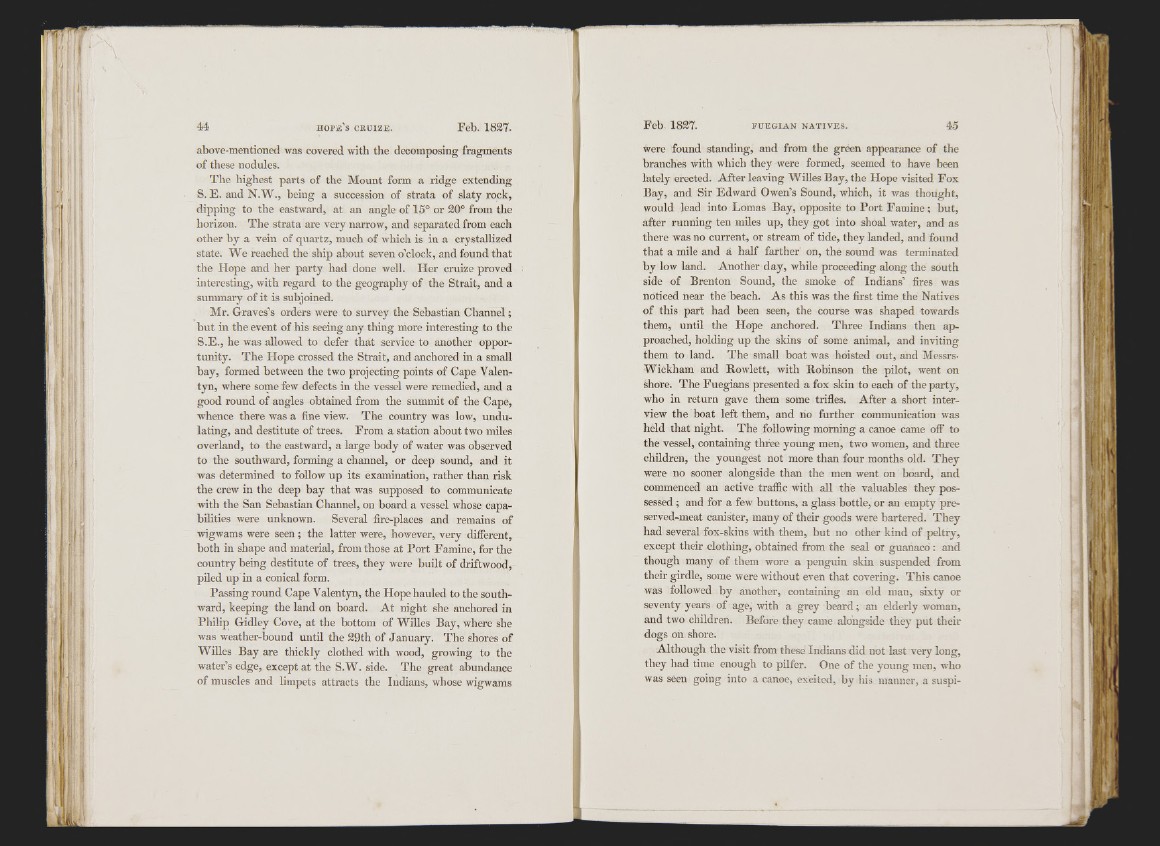
fr:::
■ , j
i '
I i
above-mentioned was covered with the decomposing fragments
of these nodules.
The highest parts of the Mount form a ridge extending
S. E. and N.W., being a succession of strata of slaty rock,
dipping to the eastward, at an angle of 13° or 20° from the
horizon. The strata are very narrow, and sepai'ated from each
other by a vein of quartz, much of which is in a crystallized
state. We reached the ship about seven o’clock, and found that
the Hope and her party had done well. Her cruize proved
interesting, with regard to the geography of the Strait, and a
summary of it is subjoined.
Mr. Graves’s orders ivere to survey the Sebastian Channel;
hut in the event of his seeing any thing more interesting to the
S.E., he was allowed to defer that service to another opportunity.
The Hope crossed the Strait, and anchored in a small
bay, formed between the two projecting points of Cape Valentyn,
where some few defects in the vessel were remedied, and a
good round of angles obtained from the summit of the Cape,
whence there ivas a fine view. The country was low, undulating,
and destitute of trees. From a station about two miles
overland, to the eastivard, a large body of ivater was observed
to the southward, forming a channel, or deep sound, and it
■was determined to follow up its examination, rather than risk
the crew in the deep bay that was supposed to communicate
with the San Sebastian Channel, on board a vessel whose capa-
bihties were unknown. Several fire-places and remains of
wigwams were seen ; the latter were, hoivever, very different,
both in shape and material, from those at Port Famine, for the
country being destitute of trees, they were built of driftwood,
piled up in a conical form.
Passing round Cape Valentyn, the Hope hauled to the south-
Avard, keeping the land on board. At night she anchored in
Philip Gidley Cove, at the bottom of Willes Bay, where she
Avas weather-bound until the 29th of January. The shores of
Willes Bay are thickly clothed with wood, groAving to the
water’s edge, except at the S.W. side. The great abundance
of muscles and limpets attracts the Indians, whose wigwams
were found standing, and from the green appearance of the
branches with which they were formed, seemed to have been
lately erected. After leaving Willes Bay, the Hope visited Fox
Bay, and Sir Edward Owen’s Sound, which, it Avas thought,
would lead into Lomas Bay, opposite to Port Famine; but,
after running ten miles up, they got into shoal water, and as
there was no current, or stream of tide, they landed, and found
that a mile and a half farther on, the sound was terminated
by low land. Another day, while proceeding along the south
side of Brenton Sound, the smoke of Indians’ fires Avas
noticed near the beach. As this was the first time the Natives
of this part had been seen, the course was shaped towards
them, until the Hope anchored. Three Indians then approached,
holding up the skins of some animal, and inviting
them to land. The small boat was hoisted out, and Messrs.
Wickham and RoAvlett, Avith Robinson the pilot, went on
shore. The Fuegians presented a fox skin to each of the party,
who in return gave them some trifles. After a short interview
the boat left them, and no further communication Avas
held that night. The following morning a canoe came off to
the vessel, containing three young men, two Avomen, and three
children, the youngest not more than four months old. They
were no sooner alongside than the men Avent on board, and
commenced an active traffic Avith all the valuables they possessed
; and for a few buttons, a glass bottle, or an empty pre-
served-meat canister, many of their goods Avere bartered. They
had several fox-skins Avith them, but no other kind of peltry,
except their clothing, obtained from the seal or guanaco: and
though many of them wore a penguin skin suspended from
their girdle, some were without even that covering. This canoe
was followed by another, containing an old man, sixty or
seventy years of age, Avith a grey beai'd; an elderly woman,
and two children. Before they came alongside tliey put their
dogs on shore.
Although the visit from these Indians did not last very long,
they had time enough to pilfer. One of the young men, who
was seen going into a canoe, excited, by his manner, a suspi